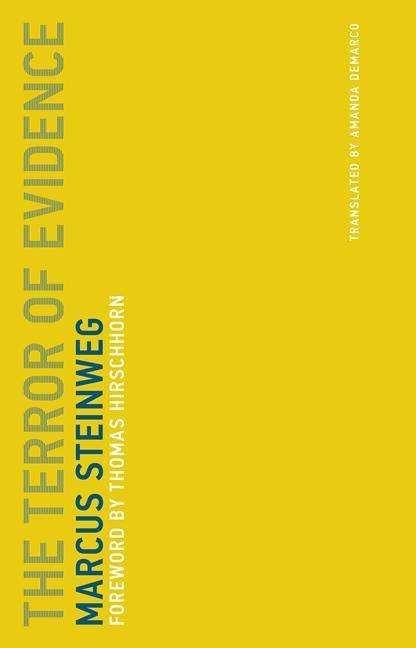Marcus Steinweg
The Terror of Evidence
Foreword by Thomas Hirschhorn
Translated by Amanda DeMarco
Untimely Meditations Series
MIT Press 2017
ISBN 9780262533430
157 pages
£13.95
Marcus Steinweg is one of the prolific contemporary philosophers based in Berlin. He works at the University of Berlin, and he has written other books on philosophical thought. He has also collaborated with Thomas Hirschorn, an artist who wrote the foreword for this book, on numerous projects that connect art and philosophy, including Friendship between Art and Philosophy; the idea which “is based on the conviction that art and philosophy are movements that reach beyond the historical moment in which they were conceived.”1
The Terror of Evidence consists of 191 sections, in the form of aphorisms, which encourage independent thinking in a world where thinking is considered a luxury of a sort, in all its elegance: “There is an elegance of thought that consists in its resistance to the imperatives of fashion at the very apex of the present. A mode of thought is elegant if it pierces the texture of the illusion called the present to reach the unknown.”2
Each section has an almost mundane, simple, universal title that serves as a starting point for developing the main thought, whether it be about the club sandwich, one of Foucault’s favourites, the horror, the truth…or any other aspect of our lives. Steinweg masterfully tackles contemporary issues, and connects philosophy to daily life experiences, society as well as art.
“His capacity to implicate the other is beautiful, bright, precise, and logical, grounded in everyday questions, which to him are always big questions. Marcus Steinweg has the knowledge and credibility that can make someone – actually anyone – love philosophy, just because he loves it himself.”3 Even if you are not a fan of philosophical thought, Steinweg’s words and hard-core philosophy will make you reconsider the notion. Crafty style of writing and even the carefully composed contents of Terror of Evidence gives a reader a choice. A choice that involves either to follow the contents layout as Steinweg himself presents it, or to get lost in no particular order in interesting and thought provoking aphorisms that tell a story about philosophy, some of the greatest philosophers of our time, art and life.
In Terror of Evidence, Steinweg builds a colossal sculpture, a philosophical work of art, which, in its own right, will never be finished. It is always growing, and always creating something new, allowing us to perceive it in our own way, to develop our own process of thinking, and in the end, “…to think more, to think more clearly, to think more powerfully, to think faster, to think beyond.”4, or, in other words, to think for ourselves.
Tanja Jurkovic
1 M. Steinweg, Terror of Evidence, Foreword: Marcus Steinweg’s hard-core thinking – with a light heart, by Thomas Hirschorn, XV
2 M. Steinweg, Terror of Evidence, Elegance, p.27
3 M. Steinweg, Terror of Evidence, Foreword: Marcus Steinweg’s hardcore thinking – with a light heart, by Thomas Hirschorn, xiv
4 M. Steinweg, Terror of Evidence, Foreword: Marcus Steinweg’s hardcore thinking – with a light heart, by Thomas Hirschorn, xvi
Tanja Jurkovic is a PhD candidate in Film and Media at the University of East Anglia, UK. Her research interests include horror and Gothic genre and theory, Balkan cinema, national identity, representation of mental disorders in film, as well as film, media and theatre in general.
